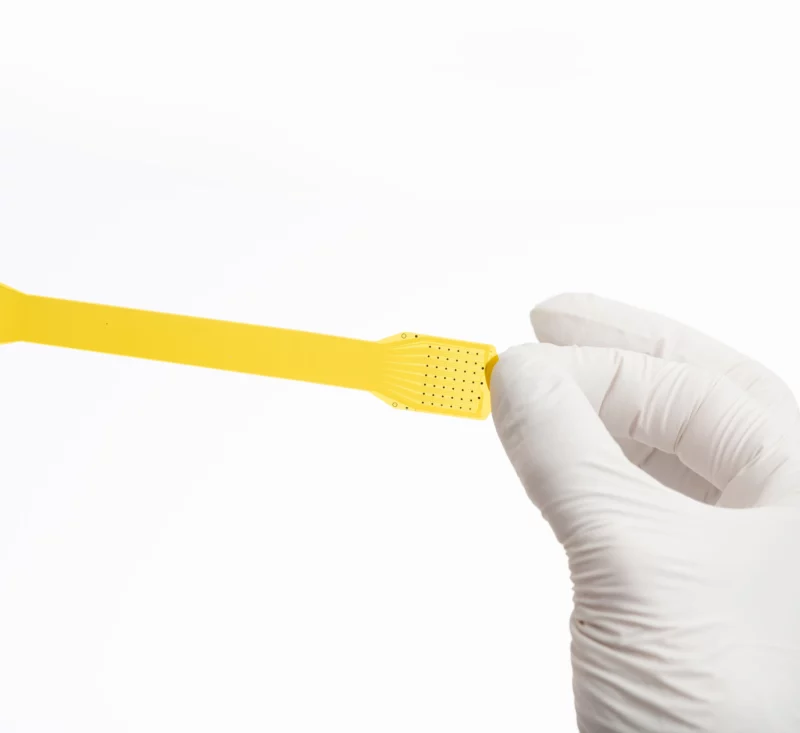
Mind-computer interface firm Precision Neuroscience says that it has set a brand new world report for the variety of neuron-tapping electrodes positioned on a dwelling human’s mind—4,096, surpassing the earlier report of two,048 set final 12 months, in line with an announcement from the corporate on Tuesday.
The excessive density of electrodes permits neuroscientists to map the exercise of neurons at unprecedented decision, which is able to finally assist them to raised decode ideas into meant actions.
Precision, like lots of its rivals, has the preliminary purpose of utilizing its brain-computer interface (BCI) to revive speech and motion in sufferers, notably those that have suffered a stroke or spinal twine harm. However Precision stands out from its opponents resulting from a notable cut up from one of the crucial high-profile BCI corporations, Neuralink, owned by controversial billionaire Elon Musk.
Precision was co-founded by neurosurgeon and engineer Ben Rapoport, who was additionally a co-founder of Neuralink again in 2016. Rapoport later left the corporate and, in 2021, began rival Precision with three colleagues, two of whom had additionally been concerned with Neuralink.
In a Might 3 episode of The Wall Avenue Journal podcast The Way forward for Every little thing, Rapoport urged he left Neuralink over security considerations for the corporate’s extra invasive BCI implants.
To maneuver neural interfaces from the world of science to the world of medication, “security is paramount,” Rapoport stated. “For a medical system, security typically implies minimal invasiveness,” he added. Rapoport famous that within the early days of BCI improvement—together with the usage of the Utah Array—”there was this notion that with a purpose to extract information-rich knowledge from the mind, one wanted to penetrate the mind with tiny little needlelike electrodes,” he stated. “And people have the disadvantage of doing a little quantity of mind harm after they’re inserted into the mind. I felt that it was doable to extract information-rich knowledge from the mind with out damaging the mind.” Precision was fashioned with that philosophy in thoughts—minimal invasiveness, scalability, and security, he stated.
Neuralink’s present BCI system accommodates 1,024 electrodes throughout 64 thinner-than-hair wires which can be implanted into the mind by a surgical robotic. Within the first affected person to obtain an implant, the wires have been inserted 3 millimeters to five mm into the mind tissue. However, 85 % of these wires retracted from the affected person’s mind within the weeks after the surgical procedure, and a few of the electrodes have been shut off as a result of displacement. Neuralink is reportedly planning to implant the wires deeper—8 mm—in its second affected person. The Meals and Drug Administration has reportedly given the inexperienced gentle for that surgical procedure. The Utah Array, in the meantime, can penetrate as much as 1.5 mm into the mind.
Precision’s system doesn’t penetrate the mind in any respect, however sits on prime of the mind. The system accommodates not less than one yellow movie, stated to be a fifth the thickness of a human hair, that accommodates 1,024 electrodes embedded in a lattice sample. The system is modular, permitting for a number of movies to be added to every system. The movies might be slipped onto the mind in a minimally invasive surgical procedure that requires slicing solely a skinny slit within the cranium, which the yellow ribbon-like system can slide by means of, in line with Precision. The movie then conforms to the floor of the mind. The processing unit that collects knowledge from the electrodes is designed to take a seat between the cranium and the scalp. If the implant must be eliminated, the movie is designed to slip off the mind with out inflicting harm.
In April, a neurosurgery crew from the Mount Sinai Well being System positioned one in all Precision’s units containing 4 electrode-containing movies—totaling 4,096 electrodes— onto the mind of a affected person who was having surgical procedure to take away a benign mind tumor. Whereas the affected person was asleep with their cranium was opened, Precision researchers used their 4 electrode arrays to efficiently report detailed neuronal exercise from an space of roughly 8 sq. centimeters of the mind.
“This report is a major step in the direction of a brand new period,” Rapoport stated in a press launch Tuesday. “The flexibility to seize cortical data of this magnitude and scale might permit us to know the mind in a a lot deeper means.”
The check of the implant marks the 14th time Precision has positioned its system on a human mind, in line with CNBC, which was current for the surgical procedure in New York. Precision says that it expects to have its first system on the business market in 2025.

